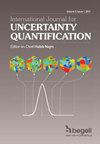VARIANCE REDUCTION METHODS AND MULTILEVEL MONTE CARLO STRATEGY FOR ESTIMATING DENSITIES OF SOLUTIONS TO RANDOM SECOND-ORDER LINEAR DIFFERENTIAL EQUATIONS
IF 1.8
4区 工程技术
Q2 ENGINEERING, MULTIDISCIPLINARY
International Journal for Uncertainty Quantification
Pub Date : 2020-01-01
DOI:10.1615/int.j.uncertaintyquantification.2020032659
引用次数: 1
Abstract
This paper concerns the estimation of the density function of the solution to a random non-autonomous second-order linear differential equation with analytic data processes. In a recent contribution, we proposed to express the density function as an expectation, and we used a standard Monte Carlo algorithm to approximate the expectation. Although the algorithms worked satisfactorily for most test-problems, some numerical challenges emerged for others, due to large statistical errors. In these situations, the convergence of the Monte Carlo simulation slows down severely, and noisy features plague the estimates. In this paper, we focus on computational aspects and propose several variance reduction methods to remedy these issues and speed up the convergence. First, we introduce a path-wise selection of the approximating processes which aims at controlling the variance of the estimator. Second, we propose a hybrid method, combining Monte Carlo and deterministic quadrature rules, to estimate the expectation. Third, we exploit the series expansions of the solutions to design a multilevel Monte Carlo estimator. The proposed methods are implemented and tested on several numerical examples to highlight the theoretical discussions and demonstrate the significant improvements achieved.随机二阶线性微分方程解密度估计的方差缩减方法和多水平蒙特卡罗策略
本文研究了一类随机非自治二阶线性微分方程解的密度函数估计。在最近的一篇文章中,我们提出将密度函数表示为期望,并使用标准蒙特卡罗算法来近似期望。尽管该算法对大多数测试问题都能令人满意地工作,但由于较大的统计误差,在其他测试问题上出现了一些数值挑战。在这些情况下,蒙特卡罗模拟的收敛速度严重减慢,并且噪声特征困扰着估计。在本文中,我们着重于计算方面,并提出了几种方差减少方法来弥补这些问题,加快收敛速度。首先,我们引入了一种旨在控制估计量方差的逼近过程的路径选择方法。其次,我们提出了一种结合蒙特卡罗和确定性正交规则的混合方法来估计期望。第三,我们利用解的级数展开来设计一个多层蒙特卡罗估计量。提出的方法在几个数值实例上进行了实施和测试,以突出理论讨论并证明所取得的显著改进。
本文章由计算机程序翻译,如有差异,请以英文原文为准。
求助全文
约1分钟内获得全文
求助全文
来源期刊

International Journal for Uncertainty Quantification
ENGINEERING, MULTIDISCIPLINARY-MATHEMATICS, INTERDISCIPLINARY APPLICATIONS
CiteScore
3.60
自引率
5.90%
发文量
28
期刊介绍:
The International Journal for Uncertainty Quantification disseminates information of permanent interest in the areas of analysis, modeling, design and control of complex systems in the presence of uncertainty. The journal seeks to emphasize methods that cross stochastic analysis, statistical modeling and scientific computing. Systems of interest are governed by differential equations possibly with multiscale features. Topics of particular interest include representation of uncertainty, propagation of uncertainty across scales, resolving the curse of dimensionality, long-time integration for stochastic PDEs, data-driven approaches for constructing stochastic models, validation, verification and uncertainty quantification for predictive computational science, and visualization of uncertainty in high-dimensional spaces. Bayesian computation and machine learning techniques are also of interest for example in the context of stochastic multiscale systems, for model selection/classification, and decision making. Reports addressing the dynamic coupling of modern experiments and modeling approaches towards predictive science are particularly encouraged. Applications of uncertainty quantification in all areas of physical and biological sciences are appropriate.
 求助内容:
求助内容: 应助结果提醒方式:
应助结果提醒方式:


